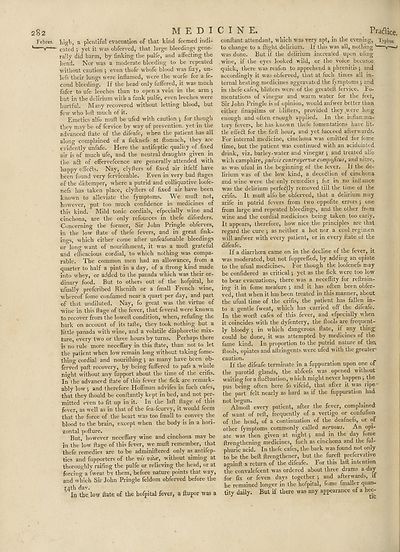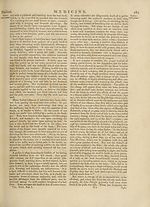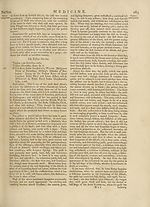Encyclopaedia Britannica, or, a Dictionary of arts, sciences, and miscellaneous literature : enlarged and improved. Illustrated with nearly six hundred engravings > Volume 13, MAT-MIC
(324) Page 282
Download files
Complete book:
Individual page:
Thumbnail gallery: Grid view | List view

282
Febres. Ingli, a plentiful evacuation of that kind feemed indi-
v cated } yet it was obferved, that large bleedings gene¬
rally did harm, by finking the pulfe, and affecting the
head. Nor was a moderate bleeding to be repeated
without caution •, even thofe whofe blood was fizv, un-
lefs their lungs were inflamed, were tile worfe for a fe-
cond bleeding. If the head only fuffered, it was much
fafer to ufe leeches than to open a vein in the arm )
but in the delirium with a funk pulfe, even leeches were
hurtful. Many recovered without letting blood, but
few who loft much of it.
Emetics alfo muft be ufed with caution ; for though
they may be of fervice by way of prevention, yet in the
advanced date of the difeafe, when the patient has all
along complained of a ficknefs at ftomach, they are
evidently unfafe. Elere the antifeptic quality of fixed
air is of much ufe, and the neutral draughts given in
the a£t of eflfervefcence are generally attended with
happy elfefts. Nay, clyfters of fixed" air itfelf have
been found very ferviceable. Even in very bad ftages
of the diftemper, where a putrid and colliquative loofe-
nefs has taken place, clyfters of fixed air have been
known to alleviate the fymptoms. We muft not,
howrever, put too much confidence in medicines of
this kind. Mild tonic cordials, efpecially wine and
cinchona, are the only refources in thefe diforders.
Concerning the former, Sir John Pringle obferves,
in the low ftate of thefe fevers, and in great fink-
ings, which either come after unfeafonable bleedings
or long want of nouriihment, it wTas a moft grateful
and efficacious cordial, to which nothing was compa¬
rable. The common men had an allowance, from a
quarter to half a pint in a day, of a ftrong kind made
into whey, or added to the panada which was their or¬
dinary food. But to others out of the hofpital, he
ufually prefcribed Rhenith or a fmall French wine,
whereof fome confumed near a quart per day, and part
of that undiluted. Nay, fo great was the virtue of
wine in this ftage of the fever, that feveral were known
to recover from the lowreft condition, when, refufing the
bark on account of its tafte, they took nothing but a
little panada with wine, and a volatile diaphoretic mix¬
ture, every two or three hours by turns. Perhaps there
is no rule more neceffary in this ftate, than not to let
the patient when low remain long without taking fome-
thing cordial and nourifhing •, as many have been ob¬
ferved part recovery, by being fuffered to pafs a whole
night without any fupport about the time of the crifis.
In the advanced ftate of this fever the fick are remark¬
ably low •, and therefore Hoffman advifes in fuch cafes,
that they fhould be conftantly kept in bed, and not per¬
mitted even to fit up in it. In the laft ftage of this
fever, as well as in that of the fea-feurvy, it would feem
that the force of the heart was too fmall to convey the
blood to the brain, except when the body is in a hori¬
zontal pofture.
But, however neceffary wine and cinchona may be
in the low ftage of this fever, we muft remember, that
thefe remedies are to be adminiftered only as antifep-
tics and fupporters of the vis vitce, w ithout aiming at
thoroughly raifing the pulfe or relieving the head, or at
forcing a fweat bv them, before nature points that way,
and which Sir John Pringle feldom obferved before the
14th dav.
In the low ftate of the hofpital fever, a ftupor was a
Pradice.
conftant attendant, which was very apt, in the evening, Typhus,
to change to a flight delirium. If this was all, nothing v-—'
was done. But if the delirium increaled upon ufing
wine, if the eyes looked w ild, or the voice became
quick, there was reafon to apprehend a phrenitis j and
accordingly it was obferved, that at fuch times all in¬
ternal heating medicines aggravated the fymptoms 5 and
in thefe cafes, blitters were of the greateit fervice. Fo¬
mentations of vinegar and warm water for the feet.
Sir John Pringle is of opinion, would anfwer better than
either finapiims or blitters, provided they were long
enough and often enough applied. In the inflamma¬
tory fevers, he has known thefe fomentations have lit¬
tle effe£t for the firft hour, and yet tucceed afterwards.
For internal medicine, cinchona was omitted for fome
time, but the patient was continued with an acidulated
drink, viz. barley-water and vinegar j and treated alfo
with camphire, pulvis contrayervee compojitus, and nitre,
as wras ulual in the beginning of the fever. If the de¬
lirium was of the low kind, a decoflion of cinchona
and wune were the only remedies 5 for in no infiance
wras the delirium perfeflly removed till the time of the
crifis. It muff alfo be'obferved, that a delirium may
arife in putrid fevers from two oppofite errors ; one
from large and repeated bleedings, and the other from
wine and the cordial medicines being taken too early.
It appears, therefore, how nice the principles are that
regard the cure } as neither a hot nor a cool regimen
Avill anfwer with every patient, or in every ftate of the
difeafe.
If a diarrhoea came on in the decline of the fever, it
was moderated, but not fupprefled, by adding an opiate
to the ufual medicines. For though the loofenefs may
be confidered as critical •, yet as the fick were too low
to bear evacuations, there was a neceflity for reftrain-
ing it in fome meafure ■, and it has often been obfer¬
ved, that when it has been treated in this manner, about
the ufual time of the crifis, the patient has fallen in¬
to a gentle fweat, which has carried off the difeafe.
In the worft cafes of this fever, and efpecially when
it coincides with the dyfentery, the ftools are frequent¬
ly bloody ; in which dangerous ftate, if any thing
could be done, it was attempted by medicines of the
fame kind. In proportion to the putrid nature of the,
ftools, opiates and aftringents. were ufed with the greater-
caution. #
If the difeafe terminate in a fuppuration upon one of
the parotid glands, the abfeefs wras opened without
waiting for a fluctuation, which might never happen j the
pus being often here fo vifeid, that after it was ripe *
the part felt nearly as hard as if the fuppuration had
not begun.
Almoft every patient, after the fever, complained
of want of reft, frequently of a vertigo or confufion
of the head, of a continuation of the deafnefs, or of
other fymptoms commonly called nervous. An opi¬
ate was then given at night ^ and in the day fome
ftrenalhening medicines, fuch as cinchona and the ful-
phurfc acid. ‘ In thefe cafes, the bark was found not only
to be the beft ftrengthener, but the fureft preservative
againft a return of the difeafe. For this laft intention
the convalefcent was ordered about three drams a-day
for fix or feven days together ; and afterwards, if
he remained longer in the hofpital, fome fmaller quan¬
tity daily. But if there was any appearance of a hec-
MEDICINE.
Febres. Ingli, a plentiful evacuation of that kind feemed indi-
v cated } yet it was obferved, that large bleedings gene¬
rally did harm, by finking the pulfe, and affecting the
head. Nor was a moderate bleeding to be repeated
without caution •, even thofe whofe blood was fizv, un-
lefs their lungs were inflamed, were tile worfe for a fe-
cond bleeding. If the head only fuffered, it was much
fafer to ufe leeches than to open a vein in the arm )
but in the delirium with a funk pulfe, even leeches were
hurtful. Many recovered without letting blood, but
few who loft much of it.
Emetics alfo muft be ufed with caution ; for though
they may be of fervice by way of prevention, yet in the
advanced date of the difeafe, when the patient has all
along complained of a ficknefs at ftomach, they are
evidently unfafe. Elere the antifeptic quality of fixed
air is of much ufe, and the neutral draughts given in
the a£t of eflfervefcence are generally attended with
happy elfefts. Nay, clyfters of fixed" air itfelf have
been found very ferviceable. Even in very bad ftages
of the diftemper, where a putrid and colliquative loofe-
nefs has taken place, clyfters of fixed air have been
known to alleviate the fymptoms. We muft not,
howrever, put too much confidence in medicines of
this kind. Mild tonic cordials, efpecially wine and
cinchona, are the only refources in thefe diforders.
Concerning the former, Sir John Pringle obferves,
in the low ftate of thefe fevers, and in great fink-
ings, which either come after unfeafonable bleedings
or long want of nouriihment, it wTas a moft grateful
and efficacious cordial, to which nothing was compa¬
rable. The common men had an allowance, from a
quarter to half a pint in a day, of a ftrong kind made
into whey, or added to the panada which was their or¬
dinary food. But to others out of the hofpital, he
ufually prefcribed Rhenith or a fmall French wine,
whereof fome confumed near a quart per day, and part
of that undiluted. Nay, fo great was the virtue of
wine in this ftage of the fever, that feveral were known
to recover from the lowreft condition, when, refufing the
bark on account of its tafte, they took nothing but a
little panada with wine, and a volatile diaphoretic mix¬
ture, every two or three hours by turns. Perhaps there
is no rule more neceffary in this ftate, than not to let
the patient when low remain long without taking fome-
thing cordial and nourifhing •, as many have been ob¬
ferved part recovery, by being fuffered to pafs a whole
night without any fupport about the time of the crifis.
In the advanced ftate of this fever the fick are remark¬
ably low •, and therefore Hoffman advifes in fuch cafes,
that they fhould be conftantly kept in bed, and not per¬
mitted even to fit up in it. In the laft ftage of this
fever, as well as in that of the fea-feurvy, it would feem
that the force of the heart was too fmall to convey the
blood to the brain, except when the body is in a hori¬
zontal pofture.
But, however neceffary wine and cinchona may be
in the low ftage of this fever, we muft remember, that
thefe remedies are to be adminiftered only as antifep-
tics and fupporters of the vis vitce, w ithout aiming at
thoroughly raifing the pulfe or relieving the head, or at
forcing a fweat bv them, before nature points that way,
and which Sir John Pringle feldom obferved before the
14th dav.
In the low ftate of the hofpital fever, a ftupor was a
Pradice.
conftant attendant, which was very apt, in the evening, Typhus,
to change to a flight delirium. If this was all, nothing v-—'
was done. But if the delirium increaled upon ufing
wine, if the eyes looked w ild, or the voice became
quick, there was reafon to apprehend a phrenitis j and
accordingly it was obferved, that at fuch times all in¬
ternal heating medicines aggravated the fymptoms 5 and
in thefe cafes, blitters were of the greateit fervice. Fo¬
mentations of vinegar and warm water for the feet.
Sir John Pringle is of opinion, would anfwer better than
either finapiims or blitters, provided they were long
enough and often enough applied. In the inflamma¬
tory fevers, he has known thefe fomentations have lit¬
tle effe£t for the firft hour, and yet tucceed afterwards.
For internal medicine, cinchona was omitted for fome
time, but the patient was continued with an acidulated
drink, viz. barley-water and vinegar j and treated alfo
with camphire, pulvis contrayervee compojitus, and nitre,
as wras ulual in the beginning of the fever. If the de¬
lirium was of the low kind, a decoflion of cinchona
and wune were the only remedies 5 for in no infiance
wras the delirium perfeflly removed till the time of the
crifis. It muff alfo be'obferved, that a delirium may
arife in putrid fevers from two oppofite errors ; one
from large and repeated bleedings, and the other from
wine and the cordial medicines being taken too early.
It appears, therefore, how nice the principles are that
regard the cure } as neither a hot nor a cool regimen
Avill anfwer with every patient, or in every ftate of the
difeafe.
If a diarrhoea came on in the decline of the fever, it
was moderated, but not fupprefled, by adding an opiate
to the ufual medicines. For though the loofenefs may
be confidered as critical •, yet as the fick were too low
to bear evacuations, there was a neceflity for reftrain-
ing it in fome meafure ■, and it has often been obfer¬
ved, that when it has been treated in this manner, about
the ufual time of the crifis, the patient has fallen in¬
to a gentle fweat, which has carried off the difeafe.
In the worft cafes of this fever, and efpecially when
it coincides with the dyfentery, the ftools are frequent¬
ly bloody ; in which dangerous ftate, if any thing
could be done, it was attempted by medicines of the
fame kind. In proportion to the putrid nature of the,
ftools, opiates and aftringents. were ufed with the greater-
caution. #
If the difeafe terminate in a fuppuration upon one of
the parotid glands, the abfeefs wras opened without
waiting for a fluctuation, which might never happen j the
pus being often here fo vifeid, that after it was ripe *
the part felt nearly as hard as if the fuppuration had
not begun.
Almoft every patient, after the fever, complained
of want of reft, frequently of a vertigo or confufion
of the head, of a continuation of the deafnefs, or of
other fymptoms commonly called nervous. An opi¬
ate was then given at night ^ and in the day fome
ftrenalhening medicines, fuch as cinchona and the ful-
phurfc acid. ‘ In thefe cafes, the bark was found not only
to be the beft ftrengthener, but the fureft preservative
againft a return of the difeafe. For this laft intention
the convalefcent was ordered about three drams a-day
for fix or feven days together ; and afterwards, if
he remained longer in the hofpital, fome fmaller quan¬
tity daily. But if there was any appearance of a hec-
MEDICINE.
Set display mode to:
![]() Universal Viewer |
Universal Viewer | ![]() Mirador |
Large image | Transcription
Mirador |
Large image | Transcription
Images and transcriptions on this page, including medium image downloads, may be used under the Creative Commons Attribution 4.0 International Licence unless otherwise stated. ![]()
| Permanent URL | https://digital.nls.uk/192665374 |
|---|
| Attribution and copyright: |
|
|---|
| Description | Ten editions of 'Encyclopaedia Britannica', issued from 1768-1903, in 231 volumes. Originally issued in 100 weekly parts (3 volumes) between 1768 and 1771 by publishers: Colin Macfarquhar and Andrew Bell (Edinburgh); editor: William Smellie: engraver: Andrew Bell. Expanded editions in the 19th century featured more volumes and contributions from leading experts in their fields. Managed and published in Edinburgh up to the 9th edition (25 volumes, from 1875-1889); the 10th edition (1902-1903) re-issued the 9th edition, with 11 supplementary volumes. |
|---|---|
| Additional NLS resources: |
|

